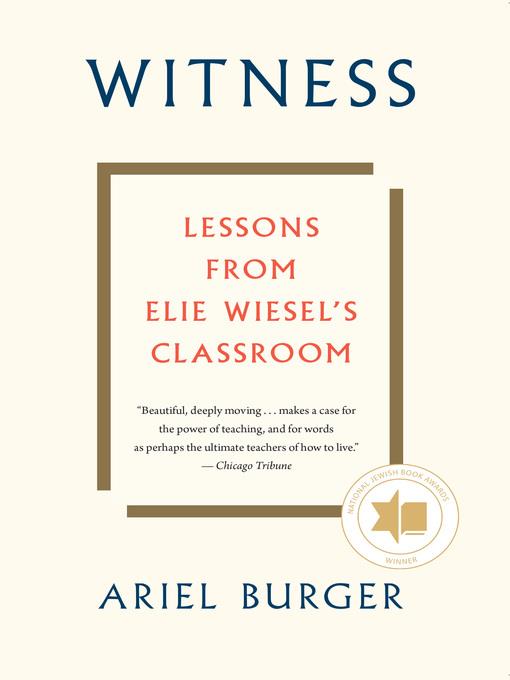
Witness
Lessons from Elie Wiesel's Classroom
کتاب های مرتبط
- اطلاعات
- نقد و بررسی
- دیدگاه کاربران
نقد و بررسی

August 15, 2018
Life lessons from Holocaust survivor and Nobel Peace Prize winner Elie Wiesel (1928-2016), as recounted by his longtime student.Debut writer Burger, an artist and rabbi, was just 15 when he first met Wiesel. He didn't know then that his college and doctoral work would be organized around Wiesel's classroom. Here, the author brings readers into the classroom, sharing with us Wiesel's readings and analyses of Kierkegaard, George Bernard Shaw, Samuel Beckett, and others. Such a book could seem exploitative, sentimental, or cheesy, but Burger has managed to craft something both inspiring and substantive. He recounts the profound moral insights Wiesel scattered abundantly through his classroom discussions and his one-on-one conversations with students--e.g., "superficiality is the enemy of everything," or how faith can be an act of protest. Wiesel's reading of the book of Job illustrates his compassion and profundity: "Job is...included in the canon...to ensure that we do not take the earlier theology of reward and punishment too far, that we do not make it a weapon." In response to a student's question about literature that depicts madmen, Wiesel opines that some people are so possessed by the vision of a world without hatred and cruelty that they "raise the alarm" whenever anything threatens peace. The rest of us, comfortably squirreled away writing the occasional letter to our elected officials, label the messianic visionaries "mad"--but it is by paying attention to them that we learn how "to effectively resist evil." Amid all the Wiesel wisdom, Burger interweaves bits of his own autobiography, including his childhood and an account of the years he spent in Israel before his doctoral studies. Neither irrelevant nor self-indulgent, these strolls into memoir help establish Burger as a trustworthy and likable guide, a fellow learner who has invited us to sit next to him as we absorb hard-won knowledge about the shape of a good life from a sage.An insightful and winsome love letter--and, for newcomers to Wiesel, a good introduction.
COPYRIGHT(2018) Kirkus Reviews, ALL RIGHTS RESERVED.

September 10, 2018
Burger, a teacher and rabbi, gives readers a glimpse into the wisdom of Elie Wiesel in this chronicle of his years as Wiesel’s student and teaching assistant. Wiesel, a Holocaust survivor, writer, and Nobel Peace Prize winner, was also a skilled educator, as Burger’s admiring account shows. The unpacking of Wiesel’s teaching methods is the book’s best contribution to Wiesel’s legacy. Current, former, and future educators will love the glimpses into Wiesel’s practices, such as the way he guided discussions on difficult but important topics—the tensions between faith and doubt, the relationship between rebellion and madness, and effective strategies for activism—and the personal attention he lavished on students. The book is weaker, however, when Burger tells his own story and when it rehashes elements of Wiesel’s philosophy and wisdom that can be better found in Wiesel’s own words in the many books he wrote. Still, Burger’s love for Wiesel, both professional and personal, shines through, and the reader will walk away with renewed admiration for this remarkable scholar, writer, survivor, and teacher.

November 1, 2018
Rabbi and teacher Burger, who served as Holocaust survivor Elie Wiesel's teaching assistant, details Wiesel's inspiring approach to education as a method to open minds and improve the world. Wiesel encouraged his students to wrestle with difficult issues including the nature of human suffering, faith vs. doubt, the meaning of witness, and the value of activism. Burger provides examples of Wiesel's reflective discussion-based lessons that used readings from classic religious and literary texts to engage students in philosophical, ethical, and spiritual debates. The author also offers insight into Wiesel's role as a mentor and friend, as Burger struggles to determine his own personal and professional path. VERDICT This work demonstrates that Wiesel's effectiveness as a life-changing teacher is a major part of his formidable legacy and presents valuable guidance for teachers seeking methods to approach difficult ethical issues in the classrooms.--Ingrid Levin, Salve Regina Univ. Lib., Newport, RI
Copyright 2018 Library Journal, LLC Used with permission.

























دیدگاه کاربران